考研出现最多的英语单词及有用的句子
- 格式:doc
- 大小:33.50 KB
- 文档页数:2
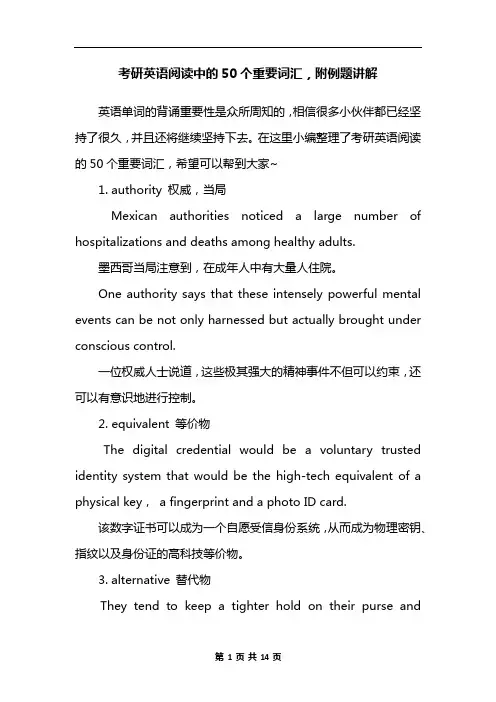
考研英语阅读中的50个重要词汇,附例题讲解英语单词的背诵重要性是众所周知的,相信很多小伙伴都已经坚持了很久,并且还将继续坚持下去。
在这里小编整理了考研英语阅读的50个重要词汇,希望可以帮到大家~1. authority 权威,当局Mexican authorities noticed a large number of hospitalizations and deaths among healthy adults.墨西哥当局注意到,在成年人中有大量人住院。
One authority says that these intensely powerful mental events can be not only harnessed but actually brought under conscious control.一位权威人士说道,这些极其强大的精神事件不但可以约束,还可以有意识地进行控制。
2. equivalent 等价物The digital credential would be a voluntary trusted identity system that would be the high-tech equivalent of a physical key,a fingerprint and a photo ID card.该数字证书可以成为一个自愿受信身份系统,从而成为物理密钥、指纹以及身份证的高科技等价物。
3. alternative 替代物They tend to keep a tighter hold on their purse andconsider eating at home a realistic alternative.他们更愿意握紧自己的钱包,把在家吃饭作为一种现实的替代。
4. substitute 代替物Devoted concertgoers reply that recordings are no substitute for live performance.忠诚的音乐会爱好者回答道,唱片并不能`1代替现场表演。
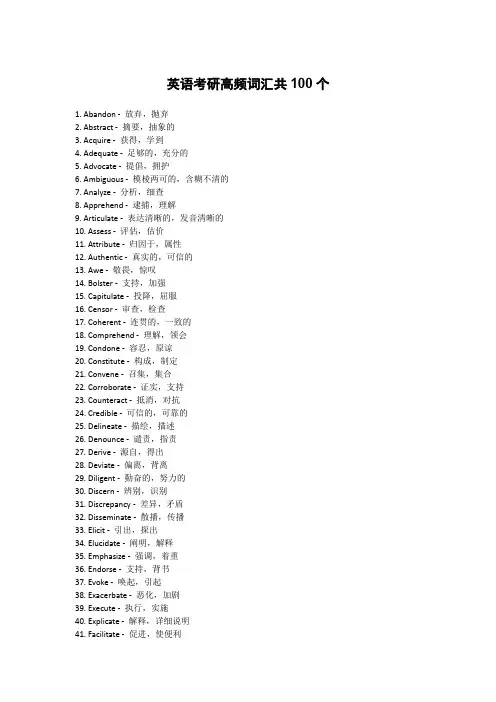
英语考研高频词汇共100个1. Abandon -放弃,抛弃2. Abstract -摘要,抽象的3. Acquire -获得,学到4. Adequate -足够的,充分的5. Advocate -提倡,拥护6. Ambiguous -模棱两可的,含糊不清的7. Analyze -分析,细查8. Apprehend -逮捕,理解9. Articulate -表达清晰的,发音清晰的10. Assess -评估,估价11. Attribute -归因于,属性12. Authentic -真实的,可信的13. Awe -敬畏,惊叹14. Bolster -支持,加强15. Capitulate -投降,屈服16. Censor -审查,检查17. Coherent -连贯的,一致的18. Comprehend -理解,领会19. Condone -容忍,原谅20. Constitute -构成,制定21. Convene -召集,集合22. Corroborate -证实,支持23. Counteract -抵消,对抗24. Credible -可信的,可靠的25. Delineate -描绘,描述26. Denounce -谴责,指责27. Derive -源自,得出28. Deviate -偏离,背离29. Diligent -勤奋的,努力的30. Discern -辨别,识别31. Discrepancy -差异,矛盾32. Disseminate -散播,传播33. Elicit -引出,探出34. Elucidate -阐明,解释35. Emphasize -强调,着重36. Endorse -支持,背书37. Evoke -唤起,引起38. Exacerbate -恶化,加剧39. Execute -执行,实施40. Explicate -解释,详细说明41. Facilitate -促进,使便利42. Feasible -可行的,可实施的43. Foster -促进,培养44. Garner -收集,储存45. Hinder -阻碍,妨碍46. Hypothesize -假设,猜测47. Illuminate -照亮,阐明48. Immerse -沉浸,专心致志49. Impede -阻碍,妨碍50. Implement -实施,执行51. Implicate -牵涉,涉及52. Incentivize -激励,鼓励53. Incite -煽动,激发54. Inquire -询问,查问55. Instigate -煽动,激起56. Integrate -整合,融合57. Intensify -加强,强化58. Invoke -援引,祈求59. Juxtapose -并列,并置60. Justify -证明合理,辩解61. Manifest -表明,显现62. Mitigate -缓和,减轻63. Necessitate -需要,使成为必要64. Negate -否定,取消65. Objectify -客观化,使具体化66. Obstruct -阻碍,妨碍67. Ponder -沉思,考虑68. Pragmatic -实用的,实际的69. Precipitate -促成,加速70. Preclude -预防,排除71. Predominate -占主导地位,支配72. Proclaim -宣告,宣布73. Propel -推动,推进74. Quantify -量化,用数量表示75. Reconcile -调和,使一致76. Redefine -重新定义,重新界定77. Refute -反驳,驳斥78. Reinforce -加强,强化79. Reiterate -重申,反复说80. Remediate -纠正,改善81. Render -使成为,提供82. Repudiate -拒绝,否认83. Resonate -共鸣,引起共鸣84. Revise -修改,修订85. Sustain -维持,支撑86. Synthesize -合成,综合87. Validate -验证,证实88. Verify -核实,证明89. Vilify -诽谤,辱骂90. Vindicate -证明清白,辩护91. Warrant -保证,担保92. Yield -生产,产出93. Zeal -热情,热忱94. Abate -减轻,减弱95. Belie -掩饰,证明为假96. Coalesce -联合,合并97. Debilitate -使衰弱,削弱98. Enervate -使衰弱,使失去力量99. Garrulous -喋喋不休的,多嘴的100. Harangue -长篇大论,高谈阔论。
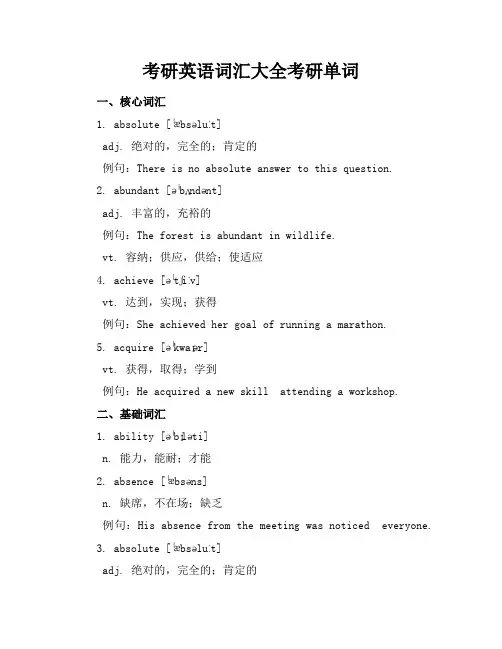
考研英语词汇大全考研单词一、核心词汇1. absolute [ˈæbsəluːt]adj. 绝对的,完全的;肯定的例句:There is no absolute answer to this question.2. abundant [əˈbʌndənt]adj. 丰富的,充裕的例句:The forest is abundant in wildlife.vt. 容纳;供应,供给;使适应4. achieve [əˈtʃiːv]vt. 达到,实现;获得例句:She achieved her goal of running a marathon.5. acquire [əˈkwaɪər]vt. 获得,取得;学到例句:He acquired a new skill attending a workshop.二、基础词汇1. ability [əˈbɪləti]n. 能力,能耐;才能2. absence [ˈæbsəns]n. 缺席,不在场;缺乏例句:His absence from the meeting was noticed everyone.3. absolute [ˈæbsəluːt]adj. 绝对的,完全的;肯定的例句:There is no absolute answer to this question.4. absorb [əbˈzɔːrb]vt. 吸收;吸引;理解例句:The sponge absorbed all the water.5. abstract [ˈæbstrækt]adj. 抽象的;深奥的n. 摘要,梗概;抽象的概念例句:This painting is an abstract representation of the artist's emotions.三、高频词汇1. adapt [əˈdæpt]vt. 使适应;改编例句:He adapted the novel for the screen.2. add [æd]vt. 添加,增加;补充说例句:Please add sugar to my coffee.3. address [əˈdres]vt. 演说;写姓名地址;对付,处理n. 地址;演讲;处理例句:The president will address the nation tonight.4. adequate [ˈædɪkwət]adj. 足够的,充分的;适当的例句:The supply is not adequate to meet the demand.5. adjust [əˈdʒʌst]vt. 调整,调节;使适合例句:You may need to adjust your expectations.这份考研英语词汇大全旨在帮助考生系统地复习和掌握考研英语所需的核心、基础和高频词汇。

考研必背的英语作文词汇1. In today's fast-paced world, it's crucial to stay up to date with the latest trends and technologies. As a result, it's important to embrace lifelong learning and constantly acquire new knowledge and skills.2. When it comes to environmental issues, it's high time we took action. From reducing our carbon footprint to promoting sustainable practices, it's imperative that weall do our part to protect our planet for future generations.3. The importance of cultural diversity cannot be overstated. By embracing different cultures and traditions, we can foster greater understanding and tolerance in our global society.4. In the age of social media, it's become easier than ever to connect with people from around the world. However, it's important to remember that online interactions shouldnever replace real-life connections and human interactions.5. The power of words should never be underestimated. Whether it's through literature, poetry, or speeches, language has the ability to inspire, provoke thought, and bring about change.6. Education is the key to unlocking opportunities and achieving personal growth. By investing in our education,we can broaden our horizons and open doors to a brighter future.7. In order to succeed in today's competitive job market, it's essential to develop a range of transferable skills. From communication to problem-solving, these skills are invaluable in any professional setting.8. The importance of mental health should never be overlooked. Taking care of our mental well-being is just as important as taking care of our physical health.9. The power of teamwork should never be underestimated.By working together, we can achieve far more than we ever could on our own.10. It's important to embrace failure as a learning opportunity. By learning from our mistakes and persevering through challenges, we can grow stronger and achieve greater success in the long run.。
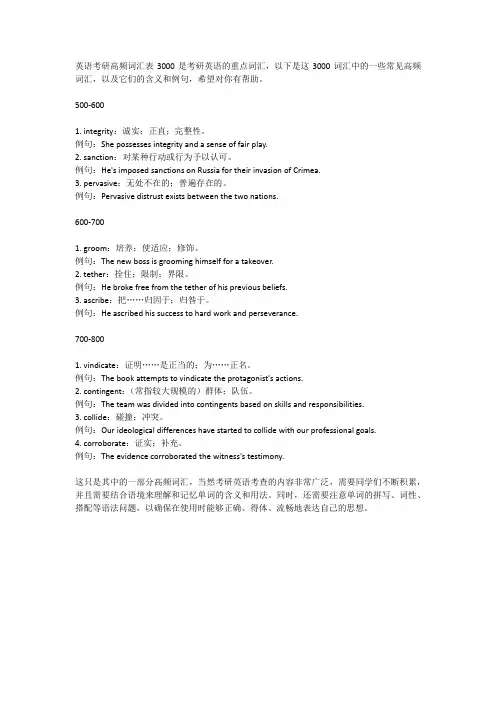
英语考研高频词汇表3000是考研英语的重点词汇,以下是这3000词汇中的一些常见高频词汇,以及它们的含义和例句,希望对你有帮助。
500-6001. integrity:诚实;正直;完整性。
例句:She possesses integrity and a sense of fair play.2. sanction:对某种行动或行为予以认可。
例句:He's imposed sanctions on Russia for their invasion of Crimea.3. pervasive:无处不在的;普遍存在的。
例句:Pervasive distrust exists between the two nations.600-7001. groom:培养;使适应;修饰。
例句:The new boss is grooming himself for a takeover.2. tether:拴住;限制;界限。
例句:He broke free from the tether of his previous beliefs.3. ascribe:把……归因于;归咎于。
例句:He ascribed his success to hard work and perseverance.700-8001. vindicate:证明……是正当的;为……正名。
例句:The book attempts to vindicate the protagonist's actions.2. contingent:(常指较大规模的)群体;队伍。
例句:The team was divided into contingents based on skills and responsibilities.3. collide:碰撞;冲突。
例句:Our ideological differences have started to collide with our professional goals.4. corroborate:证实;补充。
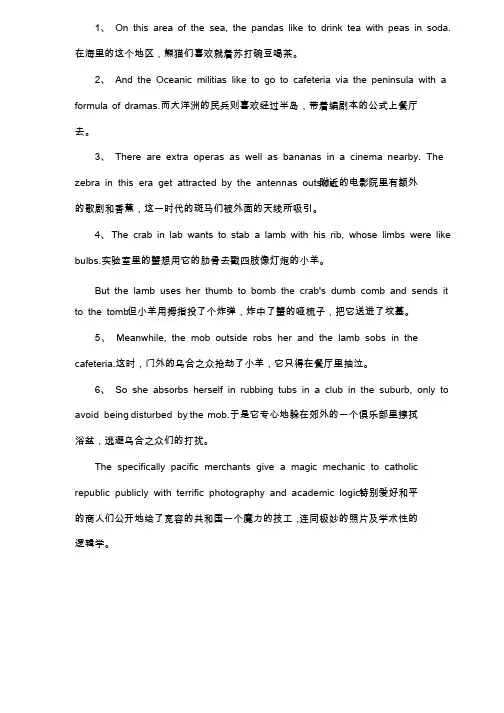
1、On this area of the sea, the pandas like to drink tea with peas in soda.在海里的这个地区,熊猫们喜欢就着苏打碗豆喝茶。
2、And the Oceanic militias like to go to cafeteria via the peninsula with a formula of dramas.而大洋洲的民兵则喜欢经过半岛,带着编剧本的公式上餐厅去。
3、There are extra operas as well as bananas in a cinema nearby. The zebra in this era get attracted by the antennas outside.附近的电影院里有额外的歌剧和香蕉,这一时代的斑马们被外面的天线所吸引。
4、The crab in lab wants to stab a lamb with his rib, whose limbs were like bulbs.实验室里的蟹想用它的肋骨去戳四肢像灯炮的小羊。
But the lamb uses her thumb to bomb the crab's dumb comb and sends it to the tomb.但小羊用拇指投了个炸弹,炸中了蟹的哑梳子,把它送进了坟墓。
5、Meanwhile, the mob outside robs her and the lamb sobs in thecafeteria.这时,门外的乌合之众抢劫了小羊,它只得在餐厅里抽泣。
6、So she absorbs herself in rubbing tubs in a club in the suburb, only to being avoid being disturbed by disturbed by the the mob.于是它专心地躲在郊外的一个俱乐部里擦拭浴盆,逃避乌合之众们的打扰。

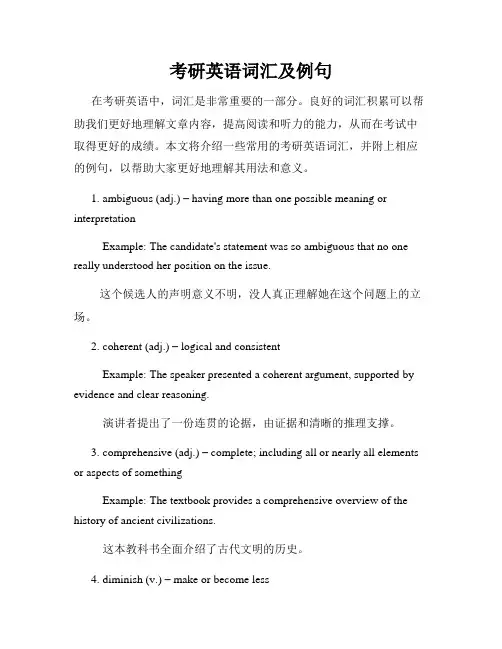
考研英语词汇及例句在考研英语中,词汇是非常重要的一部分。
良好的词汇积累可以帮助我们更好地理解文章内容,提高阅读和听力的能力,从而在考试中取得更好的成绩。
本文将介绍一些常用的考研英语词汇,并附上相应的例句,以帮助大家更好地理解其用法和意义。
1. ambiguous (adj.) – having more than one possible meaning or interpretationExample: The candidate's statement was so ambiguous that no one really understood her position on the issue.这个候选人的声明意义不明,没人真正理解她在这个问题上的立场。
2. coherent (adj.) – logical and consistentExample: The speaker presented a coherent argument, supported by evidence and clear reasoning.演讲者提出了一份连贯的论据,由证据和清晰的推理支撑。
3. comprehensive (adj.) – complete; including all or nearly all elements or aspects of somethingExample: The textbook provides a comprehensive overview of the history of ancient civilizations.这本教科书全面介绍了古代文明的历史。
4. diminish (v.) – make or become lessExample: The impact of the economic recession has diminished the purchasing power of consumers.经济衰退的影响使消费者的购买力减弱。
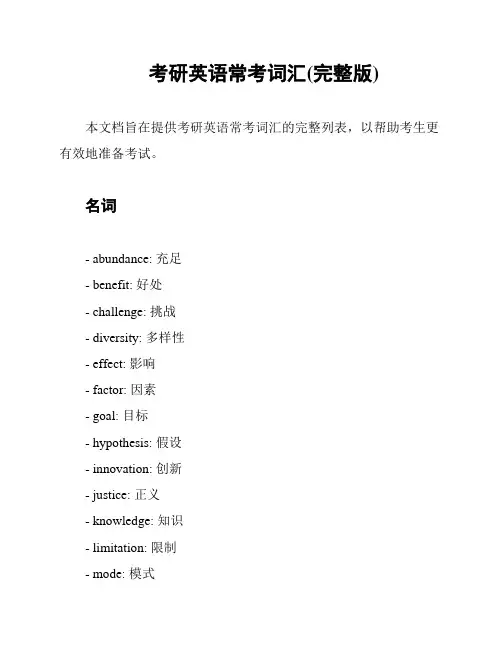
考研英语常考词汇(完整版)本文档旨在提供考研英语常考词汇的完整列表,以帮助考生更有效地准备考试。
名词- abundance: 充足- benefit: 好处- challenge: 挑战- diversity: 多样性- effect: 影响- factor: 因素- goal: 目标- hypothesis: 假设- innovation: 创新- justice: 正义- knowledge: 知识- limitation: 限制- mode: 模式- nature: 自然- opportunity: 机会- phenomenon: 现象- quality: 质量- reason: 原因- strategy: 策略- trend: 趋势动词- acquire: 获得- demonstrate: 示范- enhance: 增强- implement: 实施- maintain: 维持- promote: 促进- realize: 实现- solve: 解决- transform: 转变- undermine: 破坏- validate: 证实- weaken: 削弱- yield: 产生形容词- abundant: 丰富的- beneficial: 有益的- diverse: 多样的- effective: 有效的- influential: 有影响力的- logical: 合乎逻辑的- potential: 潜在的- significant: 重要的- relevant: 相关的- sustainable: 可持续的- valuable: 有价值的- rational: 合理的副词- accurately: 准确地- effectively: 有效地- frequently: 频繁地- ideally: 理想地- logically: 逻辑上地- repeatedly: 重复地---以上为考研英语常考词汇的完整版列表,希望对考生有所帮助。
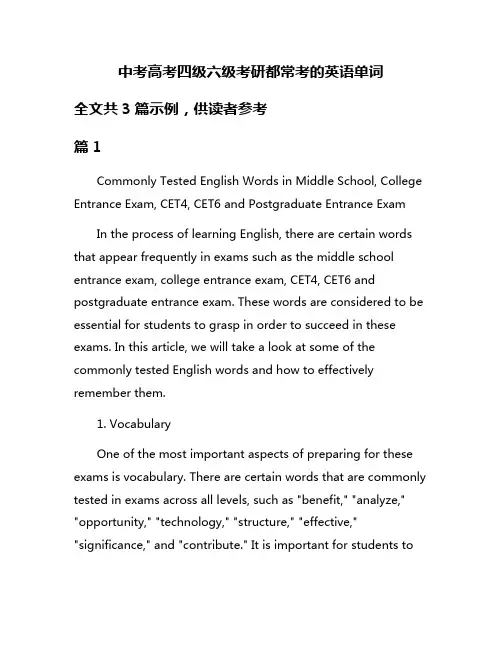
中考高考四级六级考研都常考的英语单词全文共3篇示例,供读者参考篇1Commonly Tested English Words in Middle School, College Entrance Exam, CET4, CET6 and Postgraduate Entrance ExamIn the process of learning English, there are certain words that appear frequently in exams such as the middle school entrance exam, college entrance exam, CET4, CET6 and postgraduate entrance exam. These words are considered to be essential for students to grasp in order to succeed in these exams. In this article, we will take a look at some of the commonly tested English words and how to effectively remember them.1. VocabularyOne of the most important aspects of preparing for these exams is vocabulary. There are certain words that are commonly tested in exams across all levels, such as "benefit," "analyze," "opportunity," "technology," "structure," "effective," "significance," and "contribute." It is important for students tohave a good understanding of these words and be able to use them in different contexts.2. Synonyms and AntonymsIn addition to knowing the meanings of individual words, students should also be familiar with synonyms and antonyms. This will not only help them to expand their vocabulary but also improve their reading comprehension skills. For example, knowing that "benefit" is a synonym of "advantage" and "disadvantage" is an antonym of "benefit" can be helpful in understanding the context in which these words are used.3. CollocationsCollocations are words that are commonly used together. Knowing common collocations can help students to sound more natural when speaking or writing in English. Some examples of common collocations include "make a decision," "take a risk," "give advice," "solve a problem," and "meet a deadline."4. Idioms and Phrasal VerbsIdioms and phrasal verbs are another important aspect of vocabulary that is frequently tested in exams. Idioms are expressions that have a meaning that is different from the literal meaning of the words used, such as "kick the bucket" (to die) or"beat around the bush" (to avoid talking about something directly). Phrasal verbs are verbs that are followed by one or more particles, such as "look up" (to search for information) or "give up" (to stop trying).5. Word FamiliesUnderstanding word families can also be beneficial for students preparing for exams. Word families consist of a base word and its related forms, such as nouns, verbs, adjectives, and adverbs. For example, the base word "organize" has the related forms "organization" (noun), "organizer" (noun), "organized" (adjective), and "organize" (adverb).6. Practice and ReviewFinally, in order to effectively remember all of the commonly tested English words, it is important for students to practice and review regularly. This can be done by using flashcards, doing vocabulary exercises, reading extensively, and watching English-language movies and TV shows. By incorporating these strategies into their daily routine, students can improve their vocabulary and increase their chances of success in exams.In conclusion, preparing for exams such as the middle school entrance exam, college entrance exam, CET4, CET6 andpostgraduate entrance exam requires a good understanding of commonly tested English words. By focusing on vocabulary, synonyms and antonyms, collocations, idioms and phrasal verbs, word families, and regular practice and review, students can improve their vocabulary and language skills, ultimately helping them to achieve their academic goals.篇2Commonly Tested English Words in Middle School Entrance Exams, College Entrance Exams, CET-4, CET-6, and Postgraduate Entrance ExamsIntroductionFor students preparing for middle school entrance exams, college entrance exams, CET-4, CET-6, and postgraduate entrance exams, mastering a wide range of English vocabulary is essential. These exams often test students on a variety of words that are commonly used in daily life, academic settings, and professional environments. In this article, we will explore some of the most frequently tested English words across these different exams.Commonly Tested English Words1. Academic VocabularyMany exams, including college entrance exams and postgraduate entrance exams, test students on academic vocabulary. These words are often related to specific subjects such as mathematics, science, literature, and history. Examples of academic vocabulary that are frequently tested include:- hypothesis- analysis- experiment- literature- equation- thesis- conclusion2. Everyday VocabularyIn addition to academic vocabulary, exams also test students on words that are commonly used in everyday life. These words may include:- communication- experience- opportunity- challenge- success- relationship- technology3. Word FamiliesExam takers are also often tested on word families, which consist of a base word and its various forms (e.g., noun, verb, adjective, adverb). Examples of word families that are commonly tested include:- communicate (verb), communication (noun), communicative (adjective), communicatively (adverb)- analyze (verb), analysis (noun), analytical (adjective), analytically (adverb)- produce (verb), production (noun), productive (adjective), productively (adverb)4. Idioms and Phrasal VerbsIdioms and phrasal verbs are another common area of testing in English exams. Students are often required to demonstrate an understanding of these expressions and theirmeanings. Some examples of idioms and phrasal verbs that are frequently tested include:- break the ice- hit the nail on the head- keep an eye on- put up with- run out of- take up5. Synonyms and AntonymsStudents are also tested on their knowledge of synonyms (words with similar meanings) and antonyms (words with opposite meanings). Being able to identify synonyms and antonyms is crucial for understanding context and effectively communicating in English. Some examples of synonyms and antonyms that are frequently tested include:- happy (synonym: joyful, antonym: sad)- beautiful (synonym: attractive, antonym: ugly)- learn (synonym: study, antonym: forget)- quick (synonym: fast, antonym: slow)- intelligent (synonym: smart, antonym: foolish)ConclusionIn conclusion, mastering a wide range of English vocabulary is essential for success in middle school entrance exams, college entrance exams, CET-4, CET-6, and postgraduate entrance exams. By familiarizing themselves with the commonly tested words outlined above, students can enhance their language skills and increase their chances of achieving their desired scores on these exams. Remember, practice makes perfect, so make sure to regularly review and quiz yourself on these words to solidify your understanding and retention. Good luck with your exam preparation!篇3Title: Essential English Vocabulary for Middle School Exams, College Entrance Exams, CET-4, CET-6, and Postgraduate Entrance ExamsIntroduction:English is an essential language that is widely used in the world. It is the primary language of communication in many fields, such as business, science, and academia. Therefore, mastering English vocabulary is crucial for success in variousexams, including middle school exams, college entrance exams, CET-4, CET-6, and postgraduate entrance exams. In this article, we will introduce some commonly tested English words in these exams.1. Middle School Exams:Middle school exams usually test basic English vocabulary to assess students' language proficiency. Some common words include:1) Apple – a fruit with a red or green skin and a lot of juice2) Book – a set of written or printed pages, usually bound with a cover3) Happy – feeling or showing pleasure or contentment4) School – an institution for educating children5) House – a building for human habitation2. College Entrance Exams:College entrance exams are more challenging and require a broader vocabulary range. Some commonly tested words in college entrance exams include:1) Analyze – examine methodically and in detail the constitution or structure of something2) Contribute – give (something, especially money) in order to help achieve or provide something3) Diverse – showing a great deal of variety; very different4) Hypothesis – a supposition or proposed explanation made on the basis of limited evidence5) Paradigm – a typical example or pattern of something; a model3. CET-4 and CET-6:The College English Test (CET) is a standardized exam in China that assesses English proficiency. CET-4 and CET-6 are two levels of this exam, with CET-6 being more advanced. Commonly tested words in CET exams include:1) Abandon – cease to support or look after; desert2) Efficiency – the ability to accomplish a job with a minimum expenditure of time and effort3) Infer – deduce or conclude (information) from evidence and reasoning rather than from explicit statements4) Perception – the way in which something is regarded, understood, or interpreted5) Transmit – cause (something) to pass on from one place or person to another4. Postgraduate Entrance Exams:Postgraduate entrance exams require a high level of English proficiency, with a focus on academic and specialized vocabulary. Some commonly tested words in postgraduate entrance exams include:1) Cognition – the mental action or process of acquiring knowledge and understanding through thought,experience, and the senses2) Dichotomy – a division or contrast between two things that are or are represented as being opposed or entirely different3) Empirical – based on, concerned with, or verifiable by observation or experience rather than theory or pure logic4) Qualitative – relating to, measuring, or measured by the quality of something rather than its quantity5) Synthesize – make (something) by synthesis, especially chemicallyConclusion:Mastering English vocabulary is essential for success in middle school exams, college entrance exams, CET-4, CET-6, and postgraduate entrance exams. By familiarizing yourself with commonly tested words in these exams, you can improve your language proficiency and increase your chances of achieving a high score. Remember to practice regularly and expand your vocabulary for better exam performance.。
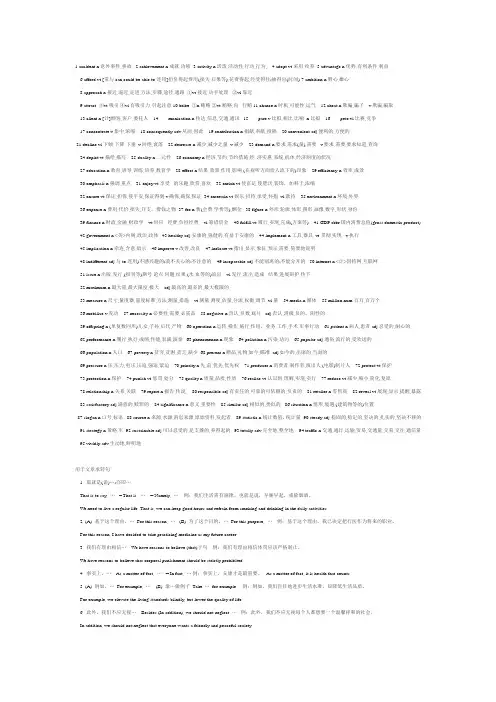
1.accident n.意外事件,事故2.achievement n.成就,功绩3.activity n.活泼,活动性,行动,行为,4.adopt vt.采用,收养5.advantage n.优势,有利条件,利益6.afford vt.[常与can,could,be able to连用]担负得起费用(损失.后果等),花费得起,经受得住;抽得出(时间)7.ambition n.野心,雄心8.approach n.接近,逼近,走进,方法,步骤,途径,通路①vt.接近,动手处理②vi.靠近9.attract ③vt.吸引④vi.有吸引力,引起注意 10.bribe ①n.贿赂②vt.贿赂,向...行贿 11.chance n.时机,可能性,运气 12.cheat n.欺骗,骗子 v.欺骗,骗取13.client n.[计]顾客,客户,委托人 14 munication n.传达,信息,交通,通讯 15 pare v.比拟,相比,比喻 n.比拟 16 pete vi.比赛,竞争17.concentrate v.集中,浓缩 18.consequently adv.从而,因此 19.contribution n.捐献,奉献,投稿 20.convenient adj.便利的,方便的21.decline vi.下倾,下降,下垂 v.回绝,衰落 22.decrease n.减少,减少之量 v.减少 23.demand n.要求,需求(量),需要 v.要求,需要,要求知道,查询24.depict vt.描绘,描写 25.duality n.二元性 26.economy n.经济,节约,节约措施,经济实惠,系统,机体,经济制度的状况cation n.教育,训导,训练,培养,教育学 28.effect n.结果,效果,作用,影响,(在视听方面给人流下的)印象 29.efficiency n.效率,成效30.emphasis n.强调,重点 31.enjoy vt.享受...的乐趣,欣赏,喜欢 32.enrich vt.使富足,使肥沃,装饰,加料于,浓缩32.ensure vt.保证,担保,使平安,保证得到 v.确保,确保,保证 34.entertain vt.娱乐,招待,承受,怀抱 vi.款待 35.environment n.环境,外界36.expense n.费用,代价,损失,开支,费钱之物 37.fee n.费(会费.学费等),酬金 38.figure n.外形,轮廓,体形,图形,画像,数字,形状,身份39.finance n.财政,金融,财政学 vt.供应...经费,负担经费 vi.筹措资金 40.fulfill vt.履行,实现,完成(方案等) 41.GDP abbr.国内消费总值(gross domestic product) ernment n.<英>内阁,政治,政体 43.healthy adj.安康的,强健的,有益于安康的 44.implement n.工具,器具 vt.贯彻,实现 v.执行45.implication n.牵连,含意,暗示 46.improve v.改善,改良 47.indicate vt.指出,显示,象征,预示,需要,简要地说明48.indifferent adj.与to连用)不感兴趣的;漠不关心的;不注意的 49.inseparable adj.不能别离的;不能分开的 50.internet n.<计>因特网,互联网51.issue n.出版,发行,(报刊等)期号,论点,问题,结果,(水,血等的)流出 vi.发行,流出,造成...结果,进展辩护,传下52.maximum n.最大量,最大限度,极大 adj.最高的,最多的,最大极限的53.measure n.尺寸,量度器,量度标准,方法,测量,措施 vt.测量,测度,估量,分派,权衡,调节 vi.量 54.media n.媒体 lion num.百万,百万个56.mobilize v.发动 57.necessity n.必要性,需要,必需品 58.negative n.否认,负数,底片 adj.否认,消极,负的,阴性的59.offspring n.(单复数同形)儿女,子孙,后代,产物 60.operation n.运转,操作,施行,作用,业务,工作,手术,军事行动 61.patient n.病人,患者 adj.忍受的,耐心的62.performance n.履行,执行,成绩,性能,表演,演奏 63.phenomenon n.现象 64.pollution n.污染,玷污 65.popular adj通俗,流行的,受欢送的66.population n.人口 67.poverty n.贫穷,贫困,贫乏,缺少 68.present n.赠品,礼物,如今,瞄准 adj.如今的,出席的,当面的69.pressure n.压,压力,电压,压迫,强迫,紧迫 70.priority n.先,前,优先,优先权 71.producer n.消费者,制作者,演出人,(电影)制片人 72.protect vt.保护73.protection n.保护 74.punish vt.惩罚,处分 75.quality n.质量,品质,性质 76.realize vt.认识到,理解,实现,实行 77.reduce vt.减少,缩小,简化,复原78.relationship n.关系,关联 79.report n.报告,传说, 80.responsible adj.有责任的,可靠的可依赖的,负责的 81.retailer n.零售商 82.reveal vt.展现,显示,提醒,暴露 83.satisfactory adj.满意的,赎罪的 84.significance n.意义,重要性 85.similar adj.相似的,类似的 86.situation n.情形,境遇,(建筑物等的)位置87.slogan n.口号,标语 88.source n.来源,水源,消息来源,原始资料,发起者 89.statistic n.统计数值,统计量 90.steady adj.稳固的,稳定的,坚决的,扎实的,坚决不移的 91.strategy n.策略,军 92.sustainable adj.可以忍受的,足支撑的,养得起的 93.totally adv.完全地,整全地 94.traffic n.交通,通行,运输,贸易,交通量,交易,交往,通信量 95.vividly adv.生动地,鲜明地用于文章承转句1. 那就是(说)…;亦即…That is to say, … = That is, … = Namely, …例:我们生活需有规律。
考研英语常见词汇汇总(1200个)A1、accommodate 使适应,使符合一致2、accompany 陪伴,伴随3、accomplish 达到(目得),完成(任务)4、accord 使符合,相一致(with)5、aggravate 使恶化;使严重6、auto-pilot a、自动导航得7、anemia 反常得8、ancestor n、祖先,先驱,起源9、accumulate 积累,积攒,积聚10、abolish 彻底废除(法律、制度、习俗等)11、accuse 指控,指责12、absolute 纯粹得,完全得13、acquaint 使认识,使了解14、ambiguous 含糊不清得,模棱两可得15、abrupt 突然得,意外得16、accustom 使习惯于17、acute 尖锐得,敏锐得18、accommodate 使适应,使符合一致19、advantage 有利条件,优点20、address 演说21、adhere 黏附,附着、22、adjacent 临近得,毗邻得23、adjoin 贴近,与、、、毗邻24、administrate 掌管,料理、、、得事务、25、adolescent (尤指16岁以下得)青少年27、advance 使向前移动28、allege 断言,宣称29、allocate 分配,分派,把、、、拨给30、allied 结盟得,有关联得31、allowance 津贴,补贴,零用钱32、alternate 交替,轮流33、amateur (艺术,科学等得)业余爱好者34、ambiguous 含糊不清得,模棱两可得35、amend 修改,修订36、amuse 逗乐,逗笑,给、、、提供娱乐(或消遣)37、anchor 锚38、announce 宣布,声称39、annoy 使恼怒,使生气40、anonymous 匿名得,无名得41、anticipate 预期,预料42、apart 成零碎43、apparent 显然得,明明白白得44、artificial 人工得,人造得,人为得45、ascend 登高,(渐渐)上升,升高46、ascertain 查明,弄清,确定47、ashamed 惭愧得,羞耻得48、ashore 向岸,向陆地49、aside 在旁边50、assault 攻击,袭击51、assemble 集合,召集52、assert 肯定地说(出),坚定地断言53、assess 估价,评价,评论54、assign 分配,布置(作业)55、assimilate 吸收,消化56、associate (使)联系,(使)结合57、assume 假定,假设58、assure 深信不疑地对、、、、、、说,向、、、、、、保证59、assurance 保证,把握,信心60、astonish 使惊讶61、attach 系,贴,连接62、attain 达到,获得63、attend 出席,参加(会议等)64、attendance 出席,参加,出席人数,出席率65、attentive 注意得,专心得66、attribute 把归因于,把、、、、、、(过错得责任等)归于(to)67、auxiliary 辅助得68、avail 有利于,有助于69、average 平均数,平均70、avert 挡开,防止,避免80、awake 醒,觉醒81、augment (使)增大,增加,增长,扩张82、August8月83、aunt 姨母,姑母,伯母,婶母,舅母,阿姨84、aural 听觉得,听力得85、authentic 真得,真正得;可靠得,可信得,有根据得86、author作者,作家,著作人;创始人,发起人87、authority 权力,权威;权威人士;(pl、)官方,当局88、auto 汽车89、automatic 自动(装置)得;无意识得90、automation 自动,自动化,自动操作91、autonomy 自治,自治权;92、autumn秋,秋季;成熟期,渐衰期93、auxiliary 辅助得,支援得n、辅助者,辅助设备94、avail 效用,利益95、available (用于物)可利用得;可见到得,接受采访得96、avenue林荫路,大街;(比喻)途径,渠道,方法97、average平均,平均数平均得;普通得98、avert 防止,避免;转移(目光、注意力等)99、aviation航空,航空学;飞机制造业100、await 等候,期待;(事情等)降临于B101、bachelor 单身汉;(亦作B-)学士(学位)102、burglar(入室行窃得)盗贼103、background背景,经历;幕后104、backward 向后得,倒行得,迟钝得105、bait 饵,引诱物106、bake烤,烘,焙;烧硬,焙干"107、balance 称,(使)平衡108、balcony 阳台;(电影院等得)楼厅,楼座109、bald 秃得,秃头得110、ball球(状物);(正式得)舞会111、ballet芭蕾舞,芭蕾舞剧;芭蕾舞团112、balloon 气球,飞船113、ballot (不记名)投票;投票总数;投票权114、ban 取缔,查禁;(from)禁止115、band条,带;乐队;波段;一群,一伙116、bandage 绷带117、bang 砰砰得声音;猛击119、bankrupt 破产得,彻底缺乏得120、banner 旗(帜)121、banquet (正式得)宴会122、barbecue 烤肉;烤肉用得台架123、barber 理发师124、barrel桶;枪管,炮管125、barren 贫瘠得;不育得;(植物)不结果得;无用得126、barrier 栅栏,屏障;障碍(物)127、base 基础,底部;根据地128、baseball棒球129、basement 建筑物得底部,地下室,地窖130、basic 基本得,基础得131、basin 盆,脸盆;内海,盆地132、basis基础,根据133、basket筐,篮,篓134、bean 豆;菜豆,蚕豆"135、bear忍受,容忍;负担136、beard胡须137、bearing轴承;忍受;关系,影响;举止;方向138、beast 兽,牲畜;凶残得人,举止粗鲁得人139、beat敲打;(心脏等)跳动140、beautiful 美得,美丽得;出色得,完美得141、beauty 美,美丽;美人,美丽得事物142、because 因为,由于143、behalf利益144、behave 举止,举动,表现;运转,开动"145、behavior 行为,举止;(机器等)运转情况"146、belief 信任,相信,信念;信仰,信条147、belly 肚子,腹部;(像肚子一样)鼓起得部分,膛148、belong (to)属于,附属,隶属;应归入(类别,范畴等)"149、beloved 受爱戴得,敬爱得;爱人,被心爱得人"150、belt (皮)带,腰带;地带"151、bench 长凳,条凳;(工作)台,座"152、bend(使)弯曲;屈从,屈服153、beneath 在…下边,在…之下154、bias(使有)偏见,偏心,偏袒"155、Bible圣经156、bibliography (有关某一专题得)书目;参考书目157、bid 祝愿;命令,吩咐;报价,投标158、bill账单;招贴,广告;(人员,职称等得)表;钞票"159、billion (美)十亿,(英)万亿"160、bin (贮藏食物等用得)箱子161、bind 捆,绑,包括,束缚"162、biography 传记;传记文学163、blossom花(簇);花期;青春164、blueprint 蓝图,设计图,计划165、blunder (因无知等而)犯大错;踉踉跄跄地走166、blunt率直得;钝得v、(使)钝;(使)迟钝167、blur 模糊不清得事物;污点168、blush脸红169、board 板,木板;全体委员;伙食170、boast 自夸,夸耀171、bright 明亮得,辉煌得;聪明得;欢快得,美好得"172、brilliant 光辉得,灿烂得;卓越得,有才华得"173、brim 边缘,帽沿174、bring 拿来,带来;产生,引起;使处于某种状态175、brisk 轻快得;生气勃勃得;兴隆得176、brittle 易碎得;脆弱得;冷淡得;(声音)尖利得177、broad 宽得,广阔得;广大得;宽宏得,豁达得"178、broadcast广播(节目)179、bronze 青铜;青铜色,古铜色;青铜制品,铜牌180、brook容忍(n、小溪)181、broom 扫帚182、brow眉(毛);额183、brown 褐色(得),棕色(得)"184、browse 随意翻阅,浏览;(牛、羊等)吃草185、bruise 青肿,挫伤;伤痕186、brutal 残忍得;严峻得;严酷得187、bubble 泡,水泡,气泡188、bucket 水桶,吊桶"189、bud 芽,花苞190、budget 预算191、buffet 自助餐192、bug 臭虫;小毛病;窃听器193、build 建造,建筑;建设,建立194、bulb 灯泡,球状物"195、bulk 体积,容积;主体,大批,大量,大块"196、bulletin 公报,公告,告示197、bully 恃强欺弱者,小流氓198、bunch(一)簇,束,捆,串199、burden 担子,重担,负担vt、给予负担或麻烦200、bureaucracy 官僚主义,官僚机构;(非民选得)委任官员C201、capture 俘虏,捕获202、case 事例,事实,事情203、cast 投,扔,抛,撒,掷204、casual 偶然得,无计划得,随便得,非正式得205、cease 停止,终止,结束206、character (事物得)性质,特质207、charge 要(价),收(费)208、charm 魅力,魔力209、chase 追逐,追求210、check 使突然停止,制止211、cherish 珍爱,珍视212、chew 嚼,咀嚼213、choke 窒息,噎住214、chorus 合唱队215、chronic (疾病)慢性得,(人)久病得216、clarity 澄清,阐明217、cling 粘着218、clumsy 笨拙得219、cluster (果实,花等得)串,束,簇220、clutch 紧抓,紧握221、coherent 一致得,协调得222、coincide 相符,相一致223、collapse 倒坍,崩溃,瓦解224、collide 碰撞,互撞225、commemorate 纪念,庆祝226、commend 表扬,称赞227、compact 紧密得,坚实得228、compare 比较,对照(with, to) 229、compatible 能与睦相处得,合得来得230、compile 汇编,编制231、comply 遵从,顺从,服从232、compose 组成,构成233、compress 压缩He234、comprise 包含,包括235、compromise 妥协,折衷236、compulsory 必须做得,义务得237、conceal 隐藏,隐瞒,隐蔽238、conceive 构想出,设想239、concentrate 集中,专心240、condemn 谴责241、condense (使)压缩,(使)凝结,使简洁242、confine 限制,使局限243、conform 遵照,适应244、confront (使)面临,(使)遭遇245、conscious 意识到得,自觉地246、consent 同意,赞同,准许247、conserve 保护,保藏,保存248、consider 考虑,细想249、consist 组成,构成(of)250、consolidate 巩固,加强251、conspicuous 显眼得,明显得,引人瞩目得252、constitute 组成,构成253、consult 请教,与、、、、、、商量254、consume 消费,花费255、contact 接触,联系,交往256、contain 包括,容纳257、contaminate弄脏,污染258、contempt轻视,轻蔑259、contest竞赛,比赛,竞争260、contract合同,契约261、contradict反驳,同…、相矛盾,同…、相抵触262、contrary相反得,对抗得263、contrast对照,对比,(对比之下显出得)差异264、contribute捐(款等),捐献265、contrive设计,想出266、controversy(尤之以文字形式进行得争论),辨证267、convention(正式)会议,(定期)大会268、convert转变,转化269、convey运送,输送,传送270、convict(经审讯)证明…有罪,宣判…有罪271、coordinate调节,协调272、cordial热情友好得,热诚得,真心得273、correspond相符合相称274、correspondent通信者,通讯员,记者275、corresponding符合得,一致得276、corrode(渐渐)损害,(一点一点地)损伤277、corrupt堕落得,腐败得,贪赃舞弊得278、courtesy 谦恭有礼。
考研常用单词大全对于考研的学子来说,英语是至关重要的一门科目,而单词则是英语学习的基石。
掌握大量的常用单词,对于提高英语成绩、理解阅读材料、撰写英语作文等方面都有着不可忽视的作用。
下面为大家整理了一份考研常用单词,希望能对大家的备考有所帮助。
一、政治类1、 democracy 民主2、 politics 政治3、 government 政府4、 policy 政策5、 administration 管理;行政6、 authority 权威;权力7、 legislation 立法8、 constitution 宪法9、 reform 改革10、 revolution 革命二、经济类1、 economy 经济2、 economic 经济的;经济学的3、 economics 经济学4、 finance 财政;金融5、 financial 金融的;财政的6、 investment 投资7、 trade 贸易8、 commercial 商业的9、 market 市场10、 consumption 消费三、文化类1、 culture 文化2、 cultural 文化的3、 tradition 传统4、 heritage 遗产5、 custom 习俗6、 religion 宗教7、 belief 信仰8、 value 价值9、 morality 道德10、 ethics 伦理四、教育类1、 education 教育2、 educational 教育的3、 school 学校4、 university 大学5、 college 学院6、 student 学生7、 teacher 教师8、 professor 教授9、 curriculum 课程10、 study 学习五、科技类1、 science 科学2、 scientific 科学的3、 technology 技术4、 technological 技术的5、 innovation 创新6、 discovery 发现7、 invention 发明8、 experiment 实验9、 data 数据10、 information 信息六、环境类1、 environment 环境2、 environmental 环境的3、 pollution 污染4、 pollutant 污染物5、 conservation 保护;保存6、 sustainable 可持续的7、 resource 资源8、 natural 自然的9、 ecology 生态学10、 climate 气候七、社会类1、 society 社会2、 social 社会的3、 community 社区;团体4、 population 人口5、 urban 城市的6、 rural 农村的7、 poverty 贫困8、 inequality 不平等9、 justice 正义;公平10、 welfare 福利八、健康类1、 health 健康2、 healthy 健康的3、 illness 疾病4、 disease 疾病5、 medicine 医学;药6、 medical 医学的7、 hospital 医院8、 doctor 医生9、 patient 病人10、 prevention 预防九、心理类1、 psychology 心理学2、 psychological 心理的3、 emotion 情感;情绪4、 feeling 感觉;感情5、 stress 压力6、 anxiety 焦虑7、 depression 抑郁8、 motivation 动机;动力9、 confidence 信心10、 personality 个性;性格十、法律类1、 law 法律2、 legal 法律的;合法的3、 legislation 立法4、 justice 司法;正义5、 court 法院6、 judge 法官7、 lawyer 律师8、 crime 犯罪9、 criminal 罪犯;犯罪的10、 penalty 处罚;刑罚以上只是考研英语中常见单词的一部分,大家在备考过程中,还需要结合历年真题、词汇书等资料,不断扩充自己的词汇量。
这些单词在考研英语试卷里出现了十几年1、a bove / beyond:介词,后面接抽象而不是具体名词时表示"无法做到”,例如:“above comprehension"的意思是"无法理解”。
2、in the absence of something:"缺少,没有”,用于替代“in short of” 或者“be lacking in”。
3、b e absorbed in something: “专心从事”。
4、abuse:用在物品词后面表示“过量使用”,用在有生命的事物后面则表示 "虐待”。
5、have access to something:这个短语最常用的意思是“to havesomething that you can use”,就是“能够用到”,当然,要根据它后面接的单词来判断其中文含义,比如“have access to town”表示“有道路通往市区”,“have access to the teacher”则是“有条件向老师请教”,而“have access to the Internet” 则表示“有上网条件”。
6、accessible / available:形容词,中文的含义同上。
7、by accident:介词词组,属于副词用法,修饰动作,意思是“偶然”。
8、accommodate:英文解释为“to accept someone's opinions and try to do what they want, especially when their opinions or needs are different from yours” 或者“to get used to a new situation or to make yourself do this”,因此中文的意思是“接受;适应”。
9、account:名词,“解释,解说,叙述”。
Not every effort will yield results, but every harvest must be worked hard. This is an unfair and irreversibleproposition.精品模板助您成功!(页眉可删)考研中英文万能金句汇总1.Chances are that man will eventually land on Mars.人类有可能最终登陆火星。
2.The likelihood for peace in the Middle East remains questionable.中东和平的可能性仍让人怀疑。
3.The necessity for nuclear nonproliferation seems clear.防止核扩散的必要性似乎清清楚楚。
4.It is perhaps more accurate to consider the family as a blanket of security, rather than a cloak of bondage.把家庭看作保护安全的'毯子可能比把它看做束缚的斗篷更确切。
5.While generalizations are dangerous, it is quite safe to present solid evidence.抽象概括是危险的,但是,提供确凿的证据是万无一失的。
6.It seems almost certain that China will achieve this years economic growth targets.中国将完成今年经济增长的目标似乎是毫无疑问的。
7.Reaching this years growth targets is almost a certainty.达到今年的增长目标几乎是必然的。
8.The urgency of the situation makes it necessary to reiterate the monumental problemsof population growth.情况的紧迫性使我们有必要重申人口增长的重大问题。
考研英语高频词汇这200个单词必背考研(Graduate Entrance Examination)是中国的一种学术考试,被广泛认为是申请研究生的重要途径之一。
其中,英语是考研的一项必考科目,而掌握高频词汇是英语考试的基础。
本文将为大家介绍考研英语中的200个高频词汇,这些单词必须熟记于心,以便在考试中获得更好的成绩。
首先,让我们从字母“A”开始。
1. abandon:v. 放弃2. ability:n. 能力3. absorb:v. 吸收4. abstract:adj. 抽象的5. academic:adj. 学术的6. accompany:v. 陪伴7. accumulate:v. 积累8. accurate:adj. 准确的9. achieve:v. 实现10. acknowledge:v. 承认接下来,让我们进一步探索高频单词。
11. acquire:v. 获得12. adapt:v. 适应13. adequate:adj. 充分的14. adjust:v. 调整15. administration:n. 管理16. adopt:v. 采用17. advocate:v. 提倡18. affect:v. 影响19. aid:n. 援助20. albeit:conj. 尽管在继续之前,我们可以看到这些词汇都是按字母顺序排列的,这样有助于记忆和查找。
接下来是"b"开头的单词。
21. benefit:n. 利益22. bias:n. 偏见23. boundary:n. 边界24. brief:adj. 简洁的25. bulk:n. 大量26. capable:adj. 有能力的27. capacity:n. 容量28. capture:v. 捕捉29. cease:v. 停止30. challenge:v. 挑战在接下来的内容中,我们将进一步了解"c"开头的高频词汇。
考研英语必考的高频短语总结今天小编为大家整理的是关于考研英语必考短语,这对大家的备考考研学习会很有帮助哦,希望大家可以好好利用起来,下面就让我们一起来学习一下吧。
1.Be keen on 执着于…They tend to be keen on volume of effort and overlook efficiency.他们倾向于在乎努力的量而忽略了效率。
2.excel at 擅长 (还有一个搭配是 excel in,是一个意思)Innovators excel at connecting seemingly unconnected things.创新者擅长联系貌似毫不相关的事物。
3.unwarranted =unjustified 不合理的The public rage was unwarranted.公众的愤怒是没有道理的4. this time round 这一次(时间状语)5. be confined to 局限于6. be no mean: 了不起,很出色,很His mother was a painter, and he's no mean artist himself.他母亲是一位画家,他自己是一位出色的艺术家。
TO be seated in the mean is no mean happiness.中庸之道是最大的幸福。
7. with no regard for 无论The parent, with no regard for the child's intrinsic urges, seeks to make him over into a replica of an admired relative--or himself.那没有关心孩子们的内在的激励的父母、只是设法使子女变成一个他所羡慕的亲戚或他本人的复制品。
8. brick-and-mortar retailers 实体零售商9. take account of 考虑10.spell out制定11.firing line 处于容易受到攻击的地位12.all but 几乎=almost13.shy away doing sth:避免做某事;14.equip sb with sth 使某人具备..15. A makes eminent sense to do sth.A对于做某事意义重大!In short, it makes eminent sense to study coding and statistics today, but also history and literature.总而言之,在当下这个时代,学习编程和统计学固然意义重大,学习历史和文学同样十分重要16.Native 先天 Acquired后天Born 先天 made 后天Nature 先天 nurture 后天Intelligence 先天 intellect 后天intuitive 先天 Cognitive 后天native talent 先天practice 后天17.hint at 预示18.appeal to 吸引Other new ventures are meant to appeal to an audience.其他一些新的企业,也准备去吸引这样一些用户19. weigh up 考虑The president must weigh up the impact of any deal on America’s economy.总统必须考量任何交易对于美国经济的影响20. go it alone 只身单干The Microsoft decides to go it alone.微软决定只身单干。
1.accid ent n.意外事件,事故2.achiev ement n.成就,功绩3.activity n.活跃,活动性,行动,行为,4.adopt vt.采用,收养5.adv antage n.优势,有利条件,利益6.affo rd vt.[常与can,could,be able to连用]担负得起费用(损失.后果等),花费得起,经受得住;抽得出(时间)7.ambition n.野心,雄心8.approach n.接近,逼近,走进,方法,步骤,途径,通路①vt.接近,动手处理②vi.靠近9.attract ③vt.吸引④vi.有吸引力,引起注意 10.bribe ①n.贿赂②vt.贿赂,向...行贿 11.chance n.机会,可能性,运气 12.ch eat n.欺骗,骗子 v.欺骗,骗取13.client n.[计]顾客,客户,委托人 14.co mmunication n.传达,信息,交通,通讯 15.co mp are v.比较,相比,比喻 n.比较 16.co mp ete vi.比赛,竞争17.concentrate v.集中,浓缩 18.consequ ently adv.从而,因此 19.contribution n.捐献,贡献,投稿 20.convenient ad j.便利的,方便的21.decline vi.下倾,下降,下垂 v.拒绝,衰落 22.decreas e n.减少,减少之量 v.减少 23.demand n.要求,需求(量),需要 v.要求,需要,要求知道,查询24.depict vt.描述,描写 25.duality n.二元性 26.econo my n.经济,节约,节约措施,经济实惠,系统,机体,经济制度的状况cation n.教育,训导,训练,培养,教育学 28.effect n.结果,效果,作用,影响,(在视听方面给人流下的)印象 29.efficiency n.效率,功效30.emph asis n.强调,重点 31.enjo y vt.享受...的乐趣,欣赏,喜爱 32.enrich vt.使富足,使肥沃,装饰,加料于,浓缩32.ensure vt.保证,担保,使安全,保证得到 v.确保,确保,保证 34.entert ain vt.娱乐,招待,接受,怀抱 vi.款待 35.environment n.环境,外界36.expense n.费用,代价,损失,开支,费钱之物 37.fee n.费(会费.学费等),酬金 38.figure n.外形,轮廓,体形,图形,画像,数字,形状,身份39.finance n.财政,金融,财政学 vt.供给...经费,负担经费 vi.筹措资金 40.fulfill vt.履行,实现,完成(计划等) 41.GDP abb r.国内生产总值(gross do mestic produ ct) ern ment n.<英>内阁,政治,政体 43.healthy adj.健康的,健壮的,有益于健康的 44.i mplement n.工具,器具 vt.贯彻,实现 v.执行45.implication n.牵连,含意,暗示 46.improv e v.改善,改进 47.indicate vt.指出,显示,象征,预示,需要,简要地说明48.indifferent ad j.与to连用)不感兴趣的;漠不关心的;不注意的 49.inseparabl e ad j.不能分离的;不能分开的 50.internet n.<计>因特网,互联网51.issue n.出版,发行,(报刊等)期号,论点,问题,结果,(水,血等的)流出 vi.发行,流出,造成...结果,进行辩护,传下52.maxi mu m n.最大量,最大限度,极大 ad j.最高的,最多的,最大极限的53.measure n.尺寸,量度器,量度标准,方法,测量,措施 vt.测量,测度,估量,分派,权衡,调节 vi.量 54.media n.媒体 lion num.百万,百万个56.mobilize v.动员 57.necessity n.必要性,需要,必需品 58.n egative n.否定,负数,底片 ad j.否定,消极,负的,阴性的59.offspring n.(单复数同形)儿女,子孙,后代,产物 60.op eration n.运转,操作,实施,作用,业务,工作,手术,军事行动 61.patient n.病人,患者 adj.忍耐的,耐心的62.performance n.履行,执行,成绩,性能,表演,演奏 63.pheno menon n.现象 64.pollution n.污染,玷污 65.popular ad j通俗,流行的,受欢迎的66.population n.人口 67.poverty n.贫穷,贫困,贫乏,缺少 68.p resent n.赠品,礼物,现在,瞄准adj.现在的,出席的,当面的69.pressure n.压,压力,电压,压迫,强制,紧迫 70.p riority n.先,前,优先,优先权 71.p roducer n.生产者,制作者,演出人,(电影)制片人 72.p rotect vt.保护73.protection n.保护 74.punish vt.惩罚,处罚 75.quality n.质量,品质,性质 76.realize vt.认识到,了解,实现,实行 77.reduce vt.减少,缩小,简化,还原78.relationship n.关系,关联 79.report n.报告,传说, 80.responsible ad j.有责任的,可靠的可依赖的,负责的 81.retailer n.零售商 82.reveal vt.展现,显示,揭示,暴露 83.satisfactory adj.满意的,赎罪的 84.significance n.意义,重要性 85.similar ad j.相似的,类似的 86.situation n.情形,境遇,(建筑物等的)位置87.slogan n.口号,标语 88.source n.来源,水源,消息来源,原始资料,发起者 89.statistic n.统计数值,统计量 90.stead y ad j.稳固的,稳定的,坚定的,扎实的,坚定不移的 91.strateg y n.策略,军 92.sustainable adj.可以忍受的,足支撑的,养得起的 93.totall y adv.完全地,整全地 94.traffic n.交通,通行,运输,贸易,交通量,交易,交往,通信量 95.vividly adv.生动地,鲜明地用于文章承转句1. 那就是(说)…;亦即…That is to say, … = Th at is, … = Namely, …例:我们生活需有规律。
也就是说,早睡早起,戒除烟酒。
We need to live a regular life. That is, we can k eep good hours and refrain fro m smok ing and drink ing in the daily activities.2. (A) 基于这个理由,…For this reason, …(B) 为了这个目的,…For this purpose, …例:基于这个理由,我已决定把行医作为未来的职业。
For this reason, I hav e decided to tak e practicing medi cine as my future career.3. 我们有理由相信… We hav e reasons to believe (that)子句例:我们有理由相信体罚应该严格禁止。
We hav e reasons to believe that corporal punishment should be stri ctly prohibited.4. 事实上,… As a matter of fact, … = In fact, …例:事实上,健康才是最重要。
As a matter of fact, it is health that counts.5. (A) 例如,…For ex ampl e, … (B) 拿…做例子Tak e …for example. 例:例如,我们盲目地提高生活水准,却降低生活品质。
For example, we elev ate the living standards blindly, but lower th e quality o f life.6. 此外,我们不应忽视… Besides (In addition), we should not negl ect …例:此外,我们不应忽视每个人都想要一个温馨祥和的社会。
In addition, we should not neglect that every on e wants a friendl y and peaceful society.7. 相反地,… on the contrary, …= b y contrast, …例:相反地,少数学生似乎还在鬼混。
On the contrary, a few students, it seems, are still fooling around.8. 另一方面,… on the other hand, …例:政府应严格执法,另一方面,大众也应该培养减少污染的好习惯。
The govern ment should enforce laws strictly. On the other hand, the public also should develop the good habit of redu cing pollution.9. 然而,很可惜的是… However, it is a pity that子句例:然而,很可惜的是他总是临时抱佛脚。
However, it is a pity that h e should alway s cram at the elev enth hour.10. 换言之,… in other words, … = to put it differentl y例:换言之,我会尽最大的努力达成我的目标。
In other words, I will try my b est to attain (gain, live up to) my goal.11. 别人可能认为这是事实,但我不是。
我认为… It may be tru e as assu med b y oth ers, but I don't. I b elieve th at子句例:别人可能认为这是事实,但我不是。